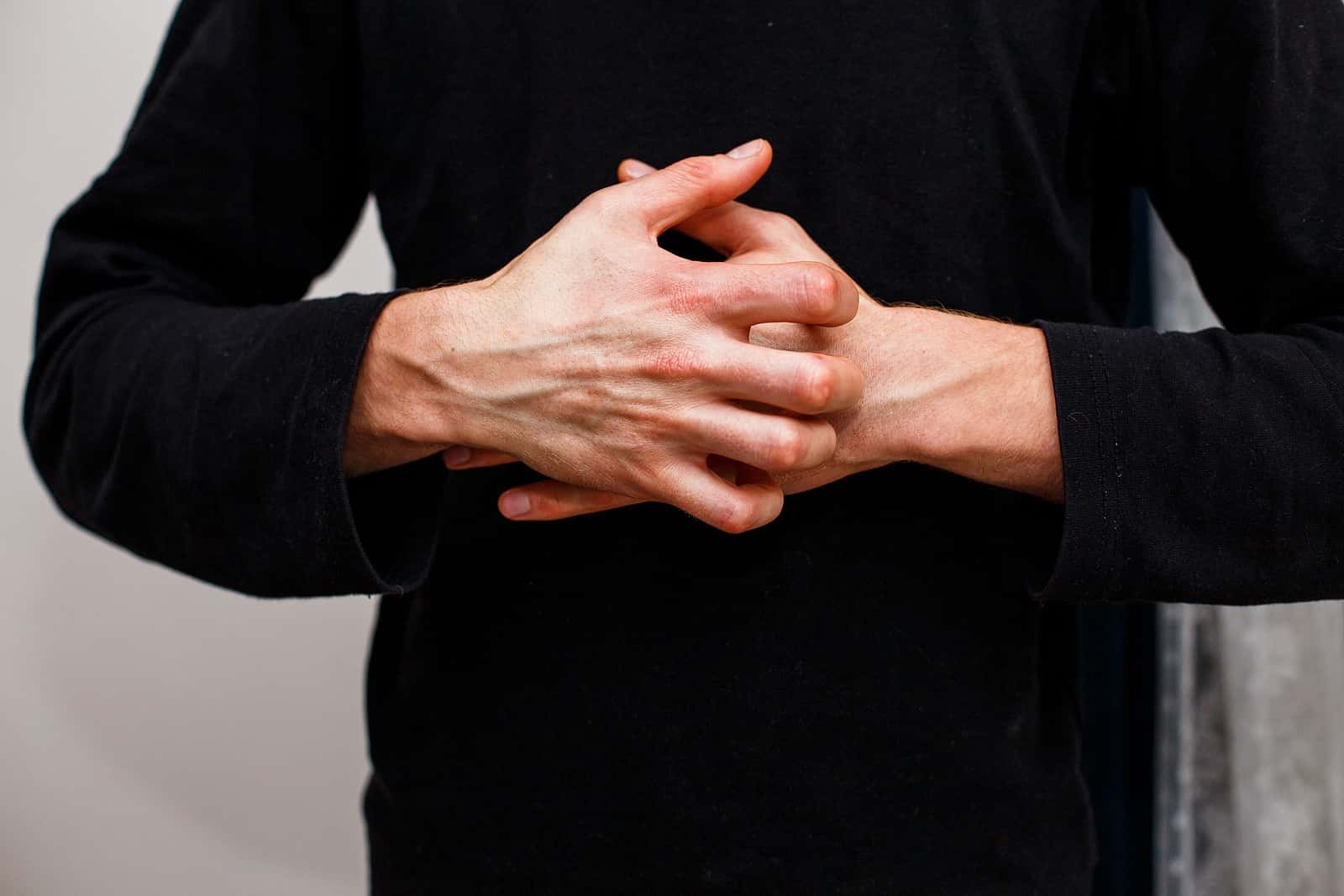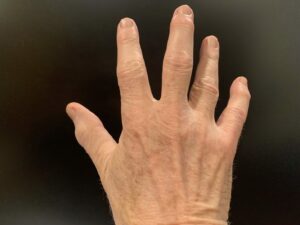
For much of the US colder weather is around the corner. That means furnaces will come on and dry air will prevail. Dry air means dry skin! When it’s hot and humid outside most folks don’t complain about dry skin. But in a few weeks many visitors to this website will begin to experience dry, rough skin. Why not plan ahead by taking advantage of our one-day 20% sale on The People’s Pharmacy Urea Skin Relief hand cream. All you have to do is insert the discount code Fall2025 into the Discount Code box when checking out! This sale stops at midnight on September 30, 2025.
We have been developing this phthalate- and paraben-free moisturizer over the course of many years. It was incredibly exciting to receive the very first order after so much planning and testing of various formulations. We are very proud of this hand cream and want to share how it came about.
Who Actually Created The People’s Pharmacy Urea Skin Relief?
Let me introduce you to Charles (Chuck) Friedman. He is the wizard behind all our body care products. That includes our most popular Aluminum-Free Magnesium Rich Roll-on Deodorants and our People’s Pharmacy Bed Soap and Leg Soap. By the way, these products are also on a one-day 20% sale using the discount code Fall2025.
Chuck has more than 50 years experience formulating a wide variety of personal care products. He is especially knowledgeable about natural products. Chuck was Scientific Director for Burt’s Bees from 1994 till 2003. While there, he formulated some amazing natural products. He was Director of Research Services at Revlon and formulated hypoallergenic products for Almay. He was also Senior Chemist at Estee Lauder.
One of Chuck’s products was awarded “Healthiest Cleanser” by Health Magazine. It was for Burt’s Bees Orange Essence Cleansing Cream. We could go on, but you get the idea. Chuck is a super star in the world of personal care natural product development.
Chuck Jumped Through Hoops to Create The People’s Pharmacy Urea Skin Relief:
When we asked Chuck to move from aluminum-free, magnesium rich, underarm deodorant development to Urea Skin Relief, he did not bat an eye. But we were very demanding. It had to be without phthalates or paraben-type preservatives. It needed to have urea. That’s because there is a lot of research demonstrating that urea can be beneficial.
Why Urea:
Dermatologists in Italy wrote the following about urea in skin care products (International Journal of Clinical Practice, Dec. 2020):
“The importance of urea in dermatology is twofold: it primarily has a physiological key role for the maintenance of skin hydration, and it secondarily has been used for more than a century in different topical preparation and concentration in various skin conditions. One of the first uses of urea was the topical treatment of wounds because of its antibacterial and proteolytic properties. Since the second part of the 20th century, urea became one of the most common moisturisers and keratolytic agents, useful for the treatment of xerosis [abnormally dry skin], atopic dermatitis [eczema], ichthyosis [rough, scaly skin] and psoriasis.”
Spanish dermatologists writing in the journal Dermatology and Therapy (Dec. 2021) offer this perspective on urea-based skin cream:
“Products with low or medium concentration (2%–20%) of urea may be indicated for routine skin care in individuals without skin disorders. Urea can decrease TEWL [transepidermal water loss], increase the water content of the stratum corneum [outer skin later], optimize the skin barrier function and upregulate antimicrobial peptides in the skin. It has also been shown to decrease skin reactivity to irritants such as sodium lauryl sulfate [SLS, a surfactant used in soaps and cleansing agents]. Furthermore, the addition of 5% urea to a hydroalcoholic gel reduced TEWL, dryness and skin reactivity. Regulatory properties of urea at the epidermis could even help to reduce skin aging.”
What About Safety?
The authors point out that:
“Urea-based formulations are well tolerated…Mild skin irritation is occasionally observed and can be more frequent with use at higher concentration. This adverse effect is temporary and usually self-resolving.”
And There’s the Rub!
I have super sensitive skin. Because I wash my hands a lot, especially during cold and flu season, the skin around my knuckles gets very rough, red, dry and chapped. But I am also sensitive to urea. Moisturizers with urea often make my skin tingle or even burn. It lasts several minutes and can be quite an unpleasant feeling.
When we asked Chuck to make a urea-containing skin care product, we told him it had to have a smooth, rich feeling, penetrate the skin quickly and not leave an oily residue. I spend many hours every day typing on a computer keyboard and clicking a mouse. I could not afford to grease up my mouse! And one more thing…too much urea makes my skin scream.
Chuck Friedman to the Rescue!
Chuck went to work on this project many years ago. I felt a lot like Goldilocks and the Three Bears. Some of Chuck’s early formulations were too greasy. Others didn’t absorb quickly enough into the skin. And then there was urea. Because of my skin sensitivity, I was always asking for a moisturizer that did not sting but still had healing properties.
After many years of trial and error, we think Chuck got it just right. We were lucky that he did not give up on us. Some people with sensitive skin may also find the first couple of applications of The People’s Pharmacy Urea Skin Relief does create a tingle. But we tried to thread the needle. Instead of 40% urea, which could be extremely irritating, we settled on 20%. Less than that might not offer enough healing power.
As the Spanish dermatologists suggest, mild skin irritation is “temporary and usually self-resolving.” That has been true in my case. After a few applications I do not experience any tingling. Over a few days my skin becomes softer. Here is a photo of my hand. And yes, I’m old and have some arthritis. If I were not using our urea-based hand cream, my knuckles would be red, rough and cracked!

Why Not Try The People’s Pharmacy Urea Skin Relief?
Thousands of people have purchased a tube of The People’s Pharmacy Urea Skin Relief. You can keep a tube on your nightstand or by the kitchen or bathroom sink.
Please let us know what you think. Chuck would like to get your feedback as well. Just go to the comment section below and add your thoughts after you have given it a try.
DO NOT FORGET the discount code: Fall2025 to get your 20% discount when checking out. You will need to put that Fall2025 code into the discount code box to get your discount, though! This discount disappears at midnight on September 30, 2025. If you want Bed Soap or Magnesium-Rich Deodorants, the code applies to these products as well!
Reader Feedback:
If you would like to see what others say about our Urea Skin Relief Intensive Skin Therapy, here are some reader comments:
Glenda gives us 5 stars!![]()
“This will be my go to moisturizer. Put on arms and hands last night and can still feel the effects today”
Linda also gives us 5 stars: ![]()
“My husband has tried many different creams for his dry itchy back over the years, but none have ever worked. However, I ordered some of your specially formulated Urea cream and Voila! It worked beautifully! He has been using it now for more than a year and has had splendid results with great relief!
Thank you SO much!!”
You can read other reviews when you go to our Urea Skin Relief page in the store. Please don’t forget the 20% discount code: Fall2025. Thank you for supporting The People’s Pharmacy! These products help keep our website and nationally syndicated radio show strong.
Citations
- Piquero-Casals, J., et al, "Urea in Dermatology: A Review of its Emollient, Moisturizing, Keratolytic, Skin Barrier Enhancing and Antimicrobial Properties," Dermatology and Therapy, Dec. 2021, doi: 10.1007/s13555-021-00611-y

